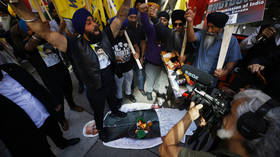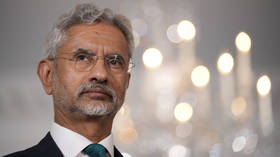India responds to airline threat by Sikh separatists

New Delhi is set to raise security concerns with Canadian authorities after a Sikh secessionist group threatened to target Air India flights traveling between the two countries.
Indian High Commissioner to Ottawa Kumar Verma told the Hindustan Times that New Delhi would seek enhanced security arrangements after the airline was targeted by an organization that wants a separate Khalistan state in northern India.
Sikhs for Justice (SFJ) is banned in India and its founder, Gurpatwant Singh Pannun, is considered a terrorist in the country. He released a video on Saturday, advising Sikhs to avoid Air India flights from November 19.
In the video, Pannun demanded the closure of Indira Gandhi International Airport in New Delhi on November 19, the same day that India is scheduled to host the Cricket World Cup final.
Former prime minister Indira Gandhi was assassinated by her Sikh bodyguards in 1984 after she launched ‘Operation Bluestar’ against Sikh separatists in Punjab state.
Meet Canada’s national plumber, Hardeep Singh Nijjar’s American lawyer, Gurpatwant Singh Pannu, who is a designated terrorist in India and also Trudeau’s source of “credible allegations” against New Delhi.In this video, Pannu warns Sikhs across the world against using Air… pic.twitter.com/1eow3KeBlR
— Sonam Mahajan (@AsYouNotWish) November 4, 2023
“We have studied the contents of the video, which is in clear violation of the Chicago Convention, which lays out a framework for international civil aviation operations,” Verma said. He added that the bilateral civil aviation agreement between India and Canada contains provisions to tackle such threats. Air India operates direct flights to Canada each week, connecting New Delhi with Toronto and Vancouver.
In September, Indian police registered a first information report (FIR) against Pannun after he made pre-recorded voice calls to nearly 60 people including policemen, lawyers, and journalists, threatening to turn the Cricket World Cup into a “World Terror Cup.”
The threats targeting Air India flights follow a diplomatic row between Canada and India over Prime Minister Justin Trudeau’s public allegations of New Delhi’s “potential” involvement in the killing of pro-Khalistan leader Hardeep Singh Nijjar.
They also have historical significance. In 1985, pro-Khalistan extremists bombed Air India flight 182, killing all 329 people on board. The victims included 268 Canadian citizens, mostly of Indian origin, and 24 Indians. Another bomb planted by terrorists exploded at Tokyo’s Narita airport, killing two Japanese baggage handlers. The bomb was intended for another Air India flight to Bangkok, but it exploded prematurely. The attacks occurred during the height of New Delhi’s crackdown on pro-Khalistan elements on Indian soil.
The attack has mainly been attributed to the separatist outfit Babbar Khalsa. Canadian police believed that one of the suspects, Talwinder Singh Parmar, had masterminded the bombing, but charges against him were ultimately dropped. Parmar was later killed in India.
Commenting on the ongoing spat with Canada in an interview with Canadian outlet, the Globe and Mail, Verma said New Delhi had not received any credible evidence from Ottawa or its allies to support the allegation that Indian agents were involved in the killing of Nijjar in June.
“There is no specific or relevant information provided in this case for us to assist them in the investigation,” Verma said. “Where is the evidence? Where is the conclusion of the investigation? I would go a step further and say now the investigation has already been tainted. A direction has come from someone at a high level to say India or Indian agents are behind it.”
On Saturday, Indian Foreign Minister Subhramanyam Jaishankar said at the Hindustan Times Leadership Summit in New Delhi that, while there was still “room for diplomacy,” the two countries should find “balance” in the matter. He emphasized, however, that freedom of speech and expression could not be a “license to advocate violence and intimidation or to propagate separatism, extremism and worse.”













